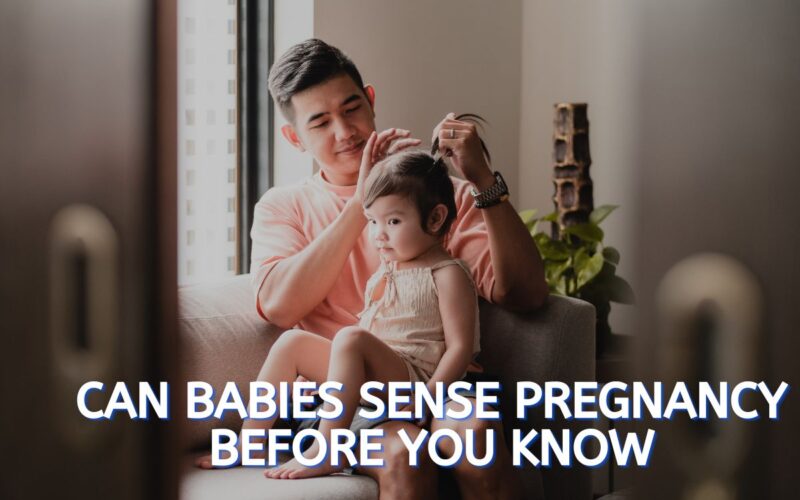Can babies sense pregnancy before you know it? Here’s how it happens: As an expectant mother, you begin to experience many changes in your body. You may notice morning sickness, fatigue and other physical symptoms. You may also notice changes in your mental state. This is all normal!
Your body doesn’t start changing until you’re about a month pregnant, and it won’t show up on a pregnancy test until then. Your signs of pregnancy will be much different than what you see in that first week or two. In fact, there are only about five things that you can really look for when trying to figure out if you’re pregnant:
Hormonal changes – You may notice that your period is lighter or heavier than usual, with some spotting in between. Your breasts may become tender and swollen, and your nipples may become darker or tingly. You may experience nausea or vomiting during your period, especially if it’s early in the pregnancy. Some women even feel sick to their stomachs every time they eat something new like garlic or pickles (these foods have high concentrations of certain chemicals that keep the lining of the uterus from shedding).
Weight gain – If you’ve been dieting and exercising regularly before becoming pregnant, your weight gain should be similar to what it was before becoming pregnant (or lower), but this isn’t always true. It’s important not to panic just because
Can babies sense pregnancy before you know
Babies can’t sense pregnancy, but they may be able to sense when their mom is sick. They’ll also be able to tell if something’s wrong with their mom by how she behaves.
Babies can’t actually feel the baby move until about 28 weeks into pregnancy, when the baby is about 4 inches long. But other signs of pregnancy may be present at earlier stages of development.
Babies often act differently around their moms in the first trimester than they do later on. During this time, they may sleep more and tend to be less active than usual. Their appetite and sleep patterns usually normalize within a few weeks after conception, though some babies continue to sleep through the night for a while after being born.
Can babies sense early pregnancy before you know
Babies can’t understand concepts like pregnancy, even if they could sense it, according to a new study.
The findings suggest that the ability to detect pregnancy by non-verbal cues is limited to adults.
Researchers from the University of Cambridge in the UK examined whether babies and toddlers could discriminate between pregnant and non-pregnant women using their own body odour as a cue.
They found that if an adult woman was wearing perfume or cologne, or had been recently menstruating, then infants would be able to tell the difference between her and a non-pregnant woman. But if she hadn’t been menstruating for at least six months or was wearing no perfume or cologne (both signs of recent exposure), then babies weren’t able to detect her pregnancy from her body odour alone.
Can your baby sense when you’re pregnant?
Babies might be able to sense your sadness or stress, but not that you’re pregnant.
The idea that babies can sense when their mom is pregnant is a popular one. You see it all over Pinterest and in parenting magazines. But many of these articles are based on anecdotal evidence and little science — so we wanted to bust some of the myths about baby feelings.
Here’s the truth: Babies can’t really tell if their mom is going to have a baby or not. It’s just not something they’ve been exposed to before birth. Their brains are wired for survival and learning, not early development and relationships.
“When I was pregnant with my first child, I was very sad,” says Rachel Goldsmith-Masterson, a mom of two in New York City who blogged about the topic last year. “I wasn’t sure if I wanted another kid … but I felt like my sadness would make things more difficult for me.”
So what are your options? Try to relax and enjoy being pregnant as much as possible — but don’t expect your baby to pick up on your moods just because you’re two months along!
Can toddlers sense pregnancy before you know?
If you’re wondering whether your baby “knows” you’re pregnant, the answer is yes. Babies are soothed by their mothers’ presence—so if you’re around more often, that’s the reason.
Babies are also comforted by the warmth of their mother’s body and skin, even before they’re born. This is why women sometimes experience morning sickness during pregnancy. The hormones in her body are affecting her brain chemistry, causing her to feel nauseous and heavy-headed.
It’s important to find ways to make your baby feel secure when you aren’t there. Here are some things that can help:
Hold him in your arms as much as possible. It’s normal for babies to be carried around by their parents from one place to another; it makes them feel safer and calms them down because they know where they are going and who will take care of them.
Never leave your child unattended without supervision or a high chair or crib nearby so he can’t crawl out of his room or play area if he wants to get away from you for a few minutes (unless this is part of a scheduled nap time).
Do Babies act different when mom is pregnant?
The first trimester can be a scary time for new moms. You’re probably worried about how your body will react to pregnancy, what your baby’s development will look like, and how you’ll manage all the new responsibilities.
While it’s true that you may just be projecting your feelings of anxiety and fear onto your baby, there are some signs that he or she may be reacting to mom’s pregnancy — even before she even knows it herself.
Do babies get clingy when mom is pregnant?
Do babies get clingy when mom is pregnant?
Babies do tend to be more clingy when you’re pregnant. It’s a biological process that makes sense. Babies are dependant on their mothers for nourishment, warmth and protection. When you’re pregnant, your body changes in ways that make it more difficult to care for yourself and your baby, so your partner becomes even more important.
But while being pregnant can make babies clingy, it doesn’t mean they’ll always be clingy. Babies can go through several stages of development before they become independent and self-reliant.
The first stage occurs within the first few months of life, when a baby’s brain starts to develop and he or she begins to recognize people around him or her as family. This is known as infant behavior. Some infants will cry often during this time, which may sound like crying for attention but is actually just normal behavior for an infant who needs comfort from his or her parents or other caregivers (such as grandparents).
In fact, most babies will continue to cry at least some of the time until they’re about 2 years old — though many don’t stop until they’re older than 3 years old








